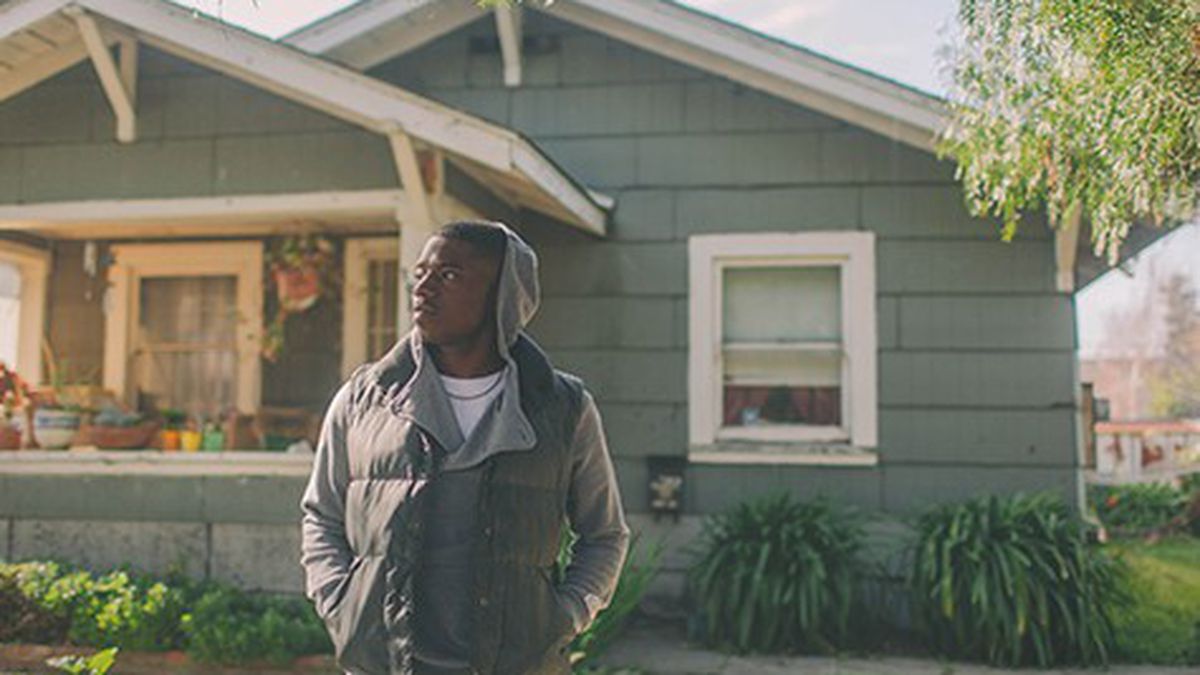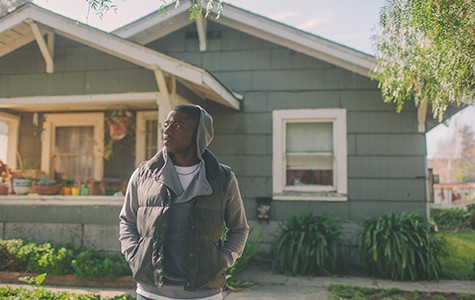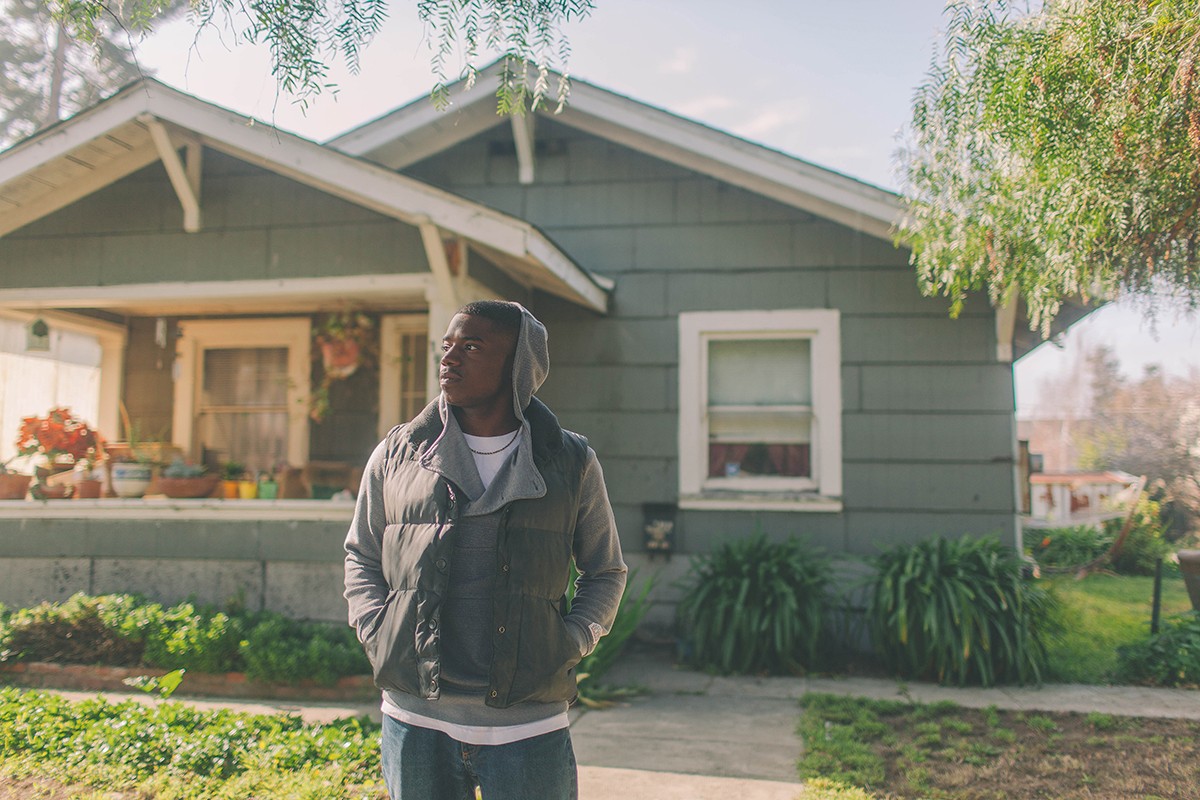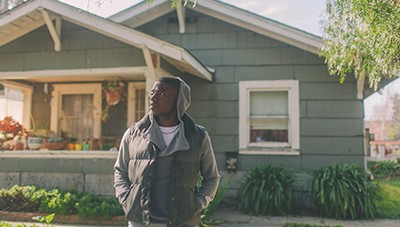By day, K.E.L.L.S. (Ian Kelly) is a therapeutic behavioral specialist who works with youth at schools and in communities throughout Contra Costa County. But by night (and on days off), the 26-year-old Oakland rapper spends his time at AfterOurs, his recording studio nestled among other industrial work spaces in San Leandro. Although some may be surprised by the combination, K.E.L.L.S.’s new mixtape showcases the same passion for inspiring others that led him to pursue a career in social work.
K.E.L.L.S. led me through a parking garage to get to his studio. A beat thumped through the walls as he opened the door. In contrast to its factory-like location in a cavernous, concrete building, AfterOurs was warm and homey inside. A large, unfinished painting of a lavender-skinned figure was propped up on an easel in front of a cushiony couch. A rapper worked on a verse in the adjacent recording booth with mismatched chairs and soundproofing foam stapled to its walls.
“This is a real family environment type of situation. We’ve all known each other for years,” said K.E.L.L.S. He and a group of about ten musically-minded young people, including engineer Mbeez, rapper GQ, and producer Boom, envisioned AfterOurs as a music and film studio, as well as a laidback hangout spot where their community of artists and musicians could work and exchange ideas.
“The Bay needs a spot like this because it gives more artists another spot to create and build that’s not just another studio,” said K.E.L.L.S. “We’re trying to get [visual] artists to come here and do their work so they can get some time in here; the production team, so they can work on films; music artists, so they can work on music. This is the hub right now, but we’re trying to make it bigger.”
AfterOurs was where K.E.L.L.S. recently hosted the listening party for his new mixtape, Good $hit Vol. 2, which is due out later this month. The genre-bending project (K.E.L.L.S. played me the rough cuts) is laidback and breezy, with effervescent jazz piano and saxophone samples intermingling with digitized vocal snippets and other glitchy effects. But its over-all feel is organic, with lots of analog instruments and a vintage sensibility. K.E.L.L.S. is currently putting together a band with a keyboard player, guitarist, and drummer to perform it live.
With his small stature and somewhat high-pitched voice, K.E.L.L.S. gets a lot of Kendrick Lamar comparisons. But apart from superficial similarities, there are commonalities between the ways he and Lamar illuminate the issues affecting their inner-city communities through narrative-driven, storytelling rap that seamlessly blends social commentary with anecdotes about relationships, family, and the pursuit of knowledge. Similar to how Lamar’s 2015 album To Pimp a Butterfly drew national attention to issues of social inequality in his native Compton, Good $hit Vol. 2 shines light on deep East Oakland, where K.E.L.L.S. grew up and still resides today.
“Good $hit Vol. 1 was me kind of experimenting,” said K.E.L.L.S., referring to the mixtape’s 2014 antecedent. “I saw myself trying out different things as well as me growing. I could tell I wasn’t polished on that tape. Transitioning to Good $hit Vol. 2, I could feel the growth as an artist. …The sense of storytelling — talking about real things in my life and others around me — but really kind of painting it so you can see it better than before.”
K.E.L.L.S. spends his days in classrooms, in the community, and in families’ homes, teaching healthy coping skills to kids — many of whom have been through the criminal justice system or are struggling with mental health issues and learning disabilities. He graduated from Howard University in 2012, and he’s currently pursuing his master’s degree in counseling psychology at Holy Names University in Oakland.
Although K.E.L.L.S. is pursuing his career as a counselor seriously, he said that his music is his primary ambition. But he intends to continue his community work regardless of where his creative pursuits take him, he said. One day, he hopes to open a community center that would provide Oaklanders with mental health resources.
“I know a lot of kids, especially in Oakland, they go through so much,” he said, pointing out that post-traumatic stress disorder is much more widespread in Oakland than most people realize. “It gets stigmatized — like PTSD is what happens to war veterans. But no, a lot of us go through it. Like me, I feel like I partially have it from going to old school parties and them getting shot up.”
Working with young people requires a keen sense of empathy for others’ struggles, and K.E.L.L.S. said that this skill helps him as a songwriter. He penned “Ryan’s Song,” from the upcoming mixtape, from the point of view of a friend dealing with a custody battle.
“I was around and I could see the hurt and pain on his face when he was going through different situations,” he said. “So that made me want to speak on his situation even more, because he’s honestly a good father trying to be there for his kids. When I saw somebody trying to take that away from him, it made me shake my head how Black men always get looked down upon for not being there for their children.”
“Let Me Live” is a plea for an end to police violence against Black people — an ever-present topic of conversation in Oakland and nationally. K.E.L.L.S. is among the current wave of young, local artists, including Elujay, Int’l Hay Sús, and Legendvry, whose work calls for unity and community-based solutions.
“This is an ongoing situation, and I really feel that way,” he said. “Let me live. I can do so much for this world if you let me live. … We’re all getting frustrated, we’re all getting angry.”














